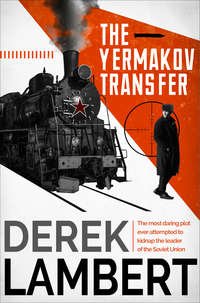
Полная версия
The Saint Peter’s Plot

THE SAINT PETER’S PLOT
Derek Lambert

COPYRIGHT
This novel is entirely a work of fiction. The names, characters and incidents portrayed in it are the work of the author’s imagination. Any resemblance to actual persons, living or dead, events or localities is entirely coincidental.
Collins Crime Club
An imprint of HarperCollinsPublishers Ltd.
1 London Bridge Street
London SE1 9GF
www.harpercollins.co.uk
First published in Great Britain by Arlington Books (Publishers) Ltd 1978
Copyright © Derek Lambert 1978
Design and illustration by Micaela Alcaino © HarperCollinsPublishers Ltd 2018
Cover photographs © Shutterstock.com
Derek Lambert asserts the moral right to be identified as the author of this work
All rights reserved under International and Pan-American Copyright Conventions. By payment of the required fees, you have been granted the non-exclusive, non-transferable right to access and read the text of this ebook on screen. No part of this text may be reproduced, transmitted, down-loaded, decompiled, reverse engineered, or stored in or introduced into any information storage and retrieval system, in any form or by any means, whether electronic or mechanical, now known or hereinafter invented, without the express written permission of HarperCollins ebooks
A catalogue record for this book is available from the British Library
HarperCollinsPublishers has made every reasonable effort to ensure that any picture content and written content in this ebook has been included or removed in accordance with the contractual and technological constraints in operation at the time of publication
Source ISBN: 9780008268374
Ebook Edition © MARCH 2018 ISBN: 9780008268374
Version: 2018-03-14
DEDICATION
For Mike and Sybil Keats,
Natasha, my god-daughter, and Alexia.
CONTENTS
Cover
Title Page
Copyright
Dedication
Part I
Chapter I
Chapter II
Chapter III
Chapter IV
Chapter V
Chapter VI
Chapter VII
Chapter VIII
Chapter IX
Chapter X
Chapter XI
Chapter XII
Chapter XIII
Chapter XIV
Chapter XV
Chapter XVI
Chapter XVII
Chapter XVIII
Chapter XIX
Part II
Chapter XX
Chapter XXI
Chapter XXII
Chapter XXIII
Chapter XXIV
Chapter XXV
Chapter XXVI
Chapter XXVII
Chapter XXVIII
Chapter XXIX
Chapter XXX
Chapter XXXI
Epilogue
Keep Reading
About The Author
By The Same Author
About the Publisher
PART I
I
The Commanding Officer of Adolf Hitler’s crack SS regiment took his leave of the Pope at 11.33 am on July 29th, 1943, unaware that he was closer to death than at any time during the bloody campaigns he had fought in Europe and Russia.
By 11.40 am Josef ‘Sepp’ Dietrich was walking briskly — a marching step almost — across St. Peter’s Square towards the line of white travertine stones that links the embracing arms of Bernini’s colonnade and marks the boundary of Vatican territory inside the city of Rome.
Behind Dietrich, former butcher and Munich bully-boy, a young man with the face of a saint and a 9 mm Walther pistol concealed beneath his jacket signalled to an older man stationed on the boundary line.
The older man, his bald patch as neat as a skull-cap, signalled back with the current edition of L’Osservatore Romano, The Vatican newspaper.
As Dietrich passed the Egyptian obelisk a sudden gust of wind disturbed the sultry day blowing plumes of spray from the two fountains, dislodging a prelate’s hat and startling a flock of pigeons into flight.
Dietrich, pugnaciously built, big-eared and cold-eyed, noticed none of this: he was too preoccupied with the speed of recent events. The Allied Invasion of Sicily; the withdrawal of his own regiment, Die Leibstandarte Adolf Hitler, from the Russian front to Italy; the dismissal and arrest on July 25 of Benito Mussolini by his own people.
The next event, Dietrich brooded, would be the capitulation of Italy to the Allies. So? Germany would be better off without them!
By the time Dietrich reached the black Mercedes-Benz waiting for him near the boundary line, the man with the bald patch had climbed into the driving seat of a Fiat 500 fuelled earlier that morning with Black Market petrol.
Dietrich paused beside the Mercedes, drumming his fingers on the bonnet. Beside him stood a plain-clothes driver, rigidly to attention waiting to dive for the door-handle.
But perhaps a walk. It had been a long time since Dietrich, founder in the early ’30s of a unit of shock troops that were the forerunners of the SS, had walked for pleasure. You didn’t walk for pleasure in Russia; you didn’t do anything for pleasure in Russia — except kill Russians.
He turned to the driver. “I’m going to walk back.” The driver displayed no surprise. “Follow me at a discreet distance.”
Dietrich set off towards the Tiber, sweating inside the double-breasted grey suit that he had last worn at a meeting with Hitler at the Eagle’s Nest in the Bavarian mountains.
The suit hung loosely on him. Small wonder after the deprivations of Russia; the battle for Rostov — the Leibstandarte’s first defeat — the Arctic winter of ’42-’43, the Pyrrhic victory at Kharkov.
But in any case, Dietrich felt uneasy in civilian clothes. He was born for uniforms, swaggering uniforms with a silver death’s head badge on the cap, the double runic ‘S’ on a steel helmet, leather belts with My Honour is my Loyalty inscribed on the buckle.
But in Rome the Germans wore civilian clothes. They were not an occupying army. Not yet.
Dietrich observed with contempt the Italians walking the streets of their capital. In particular the men. They couldn’t wait to get out of uniform, and despite the shortages of war they still managed to groom themselves as beautifully as Berlin fairies.
When Dietrich reached the great rounded bulk of Castel Sant’ Angelo, once the military bastion of Rome, he toyed with the idea of recommending that all Italian deserters be thrown into its mediaeval dungeons. And the Jews, of course. As he crossed the Ponte S. Angelo, spanning the khaki-coloured waters of the Tiber, he smiled for the first time that morning.
Behind him, a hundred yards between them, two cars followed — the black Mercedes and the little Fiat. The man with the bald patch had now been joined in the passenger seat by the young man with the Walther. They were arguing.
* * *
The plan had been simple but conceived in haste.
Word had reached the partisans from The Vatican — next to Switzerland the biggest nest of spies in Europe — that Hitler’s most feared and fearless soldier, Sepp Dietrich, had been granted an audience with the Pope.
The core of the partisani was comprised of Italian officers and troops who had seen their fellow countrymen executed by the SS on the Russian front for lack of enthusiasm for what was, to them, an insane and suicidal campaign. Dietrich, the embodiment of SS fanaticism, was an irresistible target in Rome.
But the partisani, busy deploying themselves for the inevitable German occupation, were not yet organised. Dietrich might only stay in Rome for a few hours: the assassination plot had been devised in less than thirty minutes.
According to The Vatican source, Dietrich would, after his audience with the Pope, visit the Most Rev. Alois Hudal, the German bishop renowned for his Nazi sympathies, at his church, S. Maria dell’ Anima.
The site of the church was ideal for the assassination. A stolen German stick-grenade tossed as Dietrich climbed out of the Mercedes, a maze of escape routes through the old, cobbled streets.
The young man with the saintly features had served on the Russian front, and he had been posted outside The Vatican because he could immediately identify the SS Commander. He would signal to the older man who knew Rome as intimately as a cab driver. As soon as Dietrich took off in his Mercedes the older man would drive his Fiat through the short-cuts and tell the assassin to take up his position.
And it all might have gone smoothly enough if Sepp Dietrich hadn’t decided to take a walk in the sun.
In the Fiat the young man said: “We should kill him now.”
The older man gripped his arm. “Patience, my friend.”
“Patience!” Hysteria played tricks with his vocal chords. “The biggest bastard unhung strolls in front of us and you talk about patience!”
“He will go to the church. Then we will have him.”
“Supposing he doesn’t. Supposing he changes his mind. Supposing he decides to fill his guts with pasta instead of seeing a priest.”
The older man shrugged. He was a Sicilian, said to be a relative of the legendary Mafia leader, Don Vito Cascio Ferro, and his violence was controlled and reasoned. He wished it was he who had the Walther in the belt of his trousers.
He tried to reason with the younger man whose brain had been touched by the Russian winter. “If you tried to shoot him now there would be no escape. And in any case you might miss. What is the range of a Walther P. 38? The same as a Colt .45, forty-five metres, no more. And even as you pulled the gun he” — pointing at the driver of the Mercedes — “would kill you.”
And, thought the Sicilian, under torture you would blow everything.
The hand of the younger man strayed inside his jacket. “You didn’t see what he and his sort did in Russia. You didn’t see them beat men to death with the buckles of their belts.”
“The SS?” Unsolicited, a note of admiration crept into the Sicilian’s voice. “Ruthless, perhaps,” shrugging, “but certainly the best troops in the world. Possibly the best the world has ever known.”
The younger man stared at him. “You admire them?”
“I’m merely saying they’re good soldiers.’
The younger man tightened his grip on the butt of the Walther. “Are you sure you are fighting on the right side?”
“Oh yes,” said the Sicilian, “I’m sure of that. You see I’m a Sicilian,” as if that explained everything. “But it doesn’t prevent me from admiring an enemy. Even before I kill him,” he added.
They were across the Tiber now, turning left in the direction of the Piazza Navona. The Sicilian sensed that their private crisis was over: if the trigger-happy novice at his side had made a move he would have done it on the bridge.
The young man sulked. “You know something?”
“What?” braking when the Mercedes slowed down as Dietrich stopped to take off his jacket and drape it over one arm.
“I think you were scared back there.”
“Of course I was.”
“I could have killed him.”
“Of course you could,” the Sicilian said, taking one hand from the wheel and feeling the bald patch as though he wanted to doff it.
“I’ll tell the others about this,” said the young man and the Sicilian thought: “Not if I cut out your tongue, you won’t.”
Now Dietrich was crossing the road, gesturing to the driver of the Mercedes to stop.
“Now what?” said the younger man.
“Wait and see,” the Sicilian said.
As they passed the stationary Mercedes they saw Dietrich sit down at a white-painted table outside a trattoria. Immediately a waiter with a black bow-tie and a white apron was at his side.
“You see,” the young man said, “he’s going to stuff himself with pasta.”
I hope he doesn’t expect meat sauce,” the Sicilian said. “Times are hard.”
“What are we going to do?”
“What can we do but wait?”
The Sicilian parked the Fiat beside the flaking trunk of a plane tree. “I suggest,” he said to the younger man, “that you take a stroll. Two men waiting in a car are always suspicious. Believe me, I know.”
* * *
Dietrich didn’t order pasta. He didn’t seem to have the same stomach for food these days. He ordered a bottle of Peroni beer, put his feet on the chair opposite and tried to relax. But it was difficult. There was too much on his mind, not the least of which was his audience with the Pope.
Dietrich had determined not to be overawed. After all he had but one God — Hitler. And Hitler had responded to his worship to the extent of admonishing Heinrich Himmler Reichsführer of the SS: “Dietrich is master in his own house which, I would remind you, is mine.”
Dietrich had anticipated a measure of servility from the Pope. After all, The Holy See was in peril: the German 3rd Panzergrenadier Division lurked threateningly outside Rome and Hitler was reported to have stated: “I’ll go right into The Vatican. Do you think The Vatican embarrasses me?”
Certainly not. Nor would Pius XII embarrass Sepp Dietrich.
And yet when he entered the audience chamber and saw the Pope in his white and gold robe seated on a throne on a small platform, he had immediately felt intimidated. It was all stage management, he told himself. All the old tricks of assertion — the enforced wait outside the chamber, the dominant positioning of the throne, the lighting.
But it was more. Dietrich found himself not only in the presence of the Pontiff but of a consummate diplomat who, speaking fluent German — he had been Papal Nuncio in Germany for many years — committed himself with gentle authority to absolutely nothing.
But, Dietrich comforted himself as the cool beer coursed down his throat, I did make my point. Perhaps I didn’t extract a promise but my request was not denied.
He ordered another beer from the waiter who was probably a deserter or a conscientious objector. God, how he loathed Italians.
This time he gulped the beer. Attacked it in the way he satisfied all his appetites. But, when all the beer was gone, he finally acknowledged the root of his unease which he had been concealing from himself ever since he had left The Vatican: for the first time in his life he had admitted the possibility of ultimate defeat; for the first time in his life he had admitted the fallibility of the Führer. And to the leader of the Catholic Church!
Sepp Dietrich flung some money onto the table, swung his legs off the chair and strode across the road to the Mercedes.
To the driver he snapped: “Now take me to this other crow.”
* * *
The grey Fiat beat the Mercedes by thirty-eight seconds to the Vicolo della Pace where, at No. 20, visitors were admitted to S. Maria dell’ Anima.
The young man who had rejoined the Sicilian dashed into a doorway and spoke urgently to a partisan named Angelo Peruzzi, who was waiting with the German stick-grenade hidden in a worn leather brief-case.
Peruzzi nodded, gesturing impatiently to the young man to get out of the way, and slipped the leather tongue of the briefcase. He slid one hand into the briefcase and grasped the hollow wooden handle of the grenade. An observer might have assumed that he was fingering a Bible because he was dressed as that most inconspicuous of Roman inhabitants — a priest.
He walked swiftly up the cobbled side-street, arriving outside No. 20 just twenty seconds before the black Mercedes arrived.
And then the course of Italian history, of world history, might have been changed if it had not been for a beautiful Jewish girl named Maria Reubeni.
II
Maria Reubeni had awoken that morning in her apartment in the old Jewish quarter of Rome near the Bridge of the Four Heads at 5.30.
These days she always awoke early, sometimes with problems of the previous night processed and solved, always with her mind turbulent with ideas.
Maria was a fervent Jew but not an Orthodox one. Her fervour was directed towards salvation rather than religious observation. She was sure that one day she would be a Zionist, but at the moment she was more concerned with saving Jews than rehabilitating them.
She rose from the bed and stood naked at the open window of her bedroom and peered round the yellow curtains for her daily glimpse of the river — the advertisement for the apartment had said simply ‘overlooking Tiber’ without mentioning that you could break your neck looking for it. She saw a swirl of water and withdrew from the window satisfied. It had become a ritual this daily peek at the river: not for any aesthetic reason: merely to remind her each day that the Tiber had once regularly flooded the ghetto into which Pope Paul IV had thrown the Jews in the sixteenth century. To Maria Reubeni the flow of the Tiber was the flow of Jewish persecution ever since.
But Maria was not a Jew who dolefully studied anti-Semite history while awaiting the next blow. She could not understand why the Jews of Europe were allowing themselves to be exterminated by the Germans. My God there were enough of them. Now she was determined to save the Jews of Rome.
She left the window open so that she could smell the first breaths of freshly-baked bread and coffee from the street below and turned on the shower in the bathroom. The cold water drumming on her shower-cap and sluicing down her body cooled her thoughts and gave them direction.
It was now a critical time for Italian Jewry. She and the other members of DELASEM, Delegazione Assistenza Emigranti (Jewish Emigrant Association), had known this ever since the war had started to go badly for the Axis powers. Italy would crumble. The Germans would move in. The Jews would suffer.
Now Mussolini had been ousted and it was just a matter of time … First DELASEM had to persuade the Allies and Italy’s new government under Pietro Badoglio to postpone an announcement of an armistice until they had got the Jews out of Italian-occupied France — and organised sanctuaries for the Roman Jews.
Maria dried herself, glanced briefly at her fine, heavy-breasted body in a wall mirror, dressed herself in a lime-green skirt and blouse and began to brush her long hair, so black that it seemed to have bluish lights in it.
Then she went to a cafe near the Theatre of Marcellus and ordered black coffee, the ersatz variety which tasted more like gravy, and a slice of pizza with a filling no thicker than a postage stamp.
The waiter with the anaemic moustache served her with a traditional flourish.
“Have you heard the news today?” he asked.
She shook her head, mouth full of pizza.
“Palermo has fallen,” the waiter told her.
“It fell on the twenty-second,” said Maria.
“Ah, you have better information than me.”
“I listen to the BBC.”
“Soon they will be on the mainland. Soon, perhaps, in Rome?” He looked at her hopefully. This goddess who had brains as well as beautiful bosoms.
“Perhaps,” said Maria.
The waiter pointed at the pizza and coffee. “Now every Italian knows we should never have gone to war. It is hurting us where it hurts most,” prodding his stomach. And then sadly: “We Italians are not fighters.”
She looked at him steadily. The waiter smiled uncertainly. She stood up, at least three inches taller than him. “Never let me hear you say that,” she said, searching for money in her handbag.
“You think we are fighters?” Astonished.
“You are implying that Italians are cowards,” Maria said. “Have you ever heard of Suda Bay?”
Miserably the waiter shook his head and began to clear the table to avoid her gaze.
“The Italians sank the British cruiser, York, and three supply ships. And how did they do it?” waiting until he was forced to look up. “With human torpedos, that’s how. And the pilots only ejected when the explosives were on target.”
“I didn’t mean —” the waiter began.
“The Italians are as brave as anyone. It is merely that we” — What am I, Jewish or Italian? — “are not stupid enough to sacrifice our way of life — that is what we have more than any other nation, a way of life — for an empty cause. But we are ruled by our hearts and not our minds, and that is why we allowed ourselves to be led to disaster by the Fascists.”
Her speech finished she strode from the cafe.
“Ah, she’s got guts, that one,” said a workman in blue dungarees sipping his coffee.
“Six months ago she would have been thrown into jail,” observed another.
“Perhaps she will be very soon,” said the first workman. “When the Germans come.”
The waiter said: “Why? The Germans have no love for Mussolini. Why should they throw her into jail for insulting him?’
“Because,” said the second workman, “she’s a Jew. That’s why, my friend.”
Outside the cafe Maria turned on her heel and headed towards the Corso. She was surprised at her pro-Italian outburst; after all, the Italians had introduced racial laws aimed at the Jews — even the Jewish artichoke had been renamed; but, Maria comforted herself, that had been the doing of the Fascists. But why had she wasted words on the waiter? Perhaps, she thought, because I know no man of character and strength in whom to confide; a man, that is, to whom I am physically attracted. Not even Angelo Peruzzi whose strength is a sham.
She didn’t take one of the green trams this morning. She wanted to smell the scents of Rome as it finally climbed from its bed after its drowsy awakening. The sky was misty blue and the streets rang with the clip-clop of horses’ hooves — more horses around these days than cars. But today Maria sensed a fresh nuance to the summer morning; a new expectancy as the Romans awaited the Germans, a razor-blade of cruelty; and when a pneumatic drill started up she jumped as though it were gunfire.
* * *
At the Fountain of Trevi Maria met by appointment a man she did admire. Although admiration was the limit of their relationship because the man was forty-eight — and a priest.
His name was Father Marie-Benoit, known in Rome as Maria Benedetto. He was a French Capuchin friar who had dedicated himself to rescuing Jews from their oppressors.
From the outset his career had been unorthodox. In the First World War he had served with the 44th Infantry Regiment as a stretcher-bearer and rifleman and had been awarded the Croix de Guerre with five citations and the Medaille Militaire. He was being trained as a machine-gunner when the Armistice was signed and was then transferred to the 15th Algerian Rifle Regiment in Morocco. After that he became Professor of Theology at the College International de St. Laurent.
At the outset of the present war he served first as an Italian interpreter with the French South-east Army Group. When France surrendered he went to Vichy, France, to Marseilles, sorting house of gangsters and refugees from German-occupied Europe. There he organised escape routes for the Jews.
Subsequently he was recalled by his Father Superior to Rome, where he had previously served, and was installed in the Capuchin Monastery at 159 Via Sicilia.
Currently he was working on plans to evacuate Jews from the area of southern France occupied by the Italians because, as soon as the Italian surrender to the Allies was announced, the Germans would move in and implement Hitler’s Final Solution.







